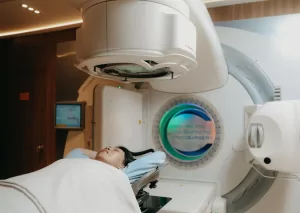What is Radiation Therapy and How Does It Work?
Radiation therapy is a powerful tool in the fight against cancer, but you may wonder exactly how it works to combat this disease. As you explore treatment options, understanding the science behind radiation therapy can help inform your decisions. This targeted approach uses high-energy rays or particles to damage cancer cells’ DNA, preventing them from growing and dividing. While it may sound daunting, modern radiation therapy techniques allow for precise targeting of tumors while minimizing effects on healthy tissue. In this article, you’ll learn about the different types of radiation therapy, how treatments are administered, and what to expect during the process.
What is Radiation Therapy?
Radiation therapy is a powerful cancer treatment that uses high-energy beams to destroy or damage cancer cells. It works by making small breaks in the DNA of cancer cells, preventing them from growing and dividing. This targeted approach is a cornerstone of radiation oncology, often used alone or in combination with other treatments like surgery or chemotherapy.
There are two main types of radiation therapy: external beam radiation therapy, which uses a machine outside the body, and internal radiation therapy, where radioactive sources are placed inside the body. More than half of cancer patients receive some form of radiation therapy during their treatment, highlighting its importance in modern cancer care.
While effective, radiation therapy can cause side effects of radiation therapy, such as fatigue, skin irritation, and organ-specific issues. However, these are often outweighed by the potential benefits in fighting cancer.
Conditions Radiation Therapy Can Treat
Radiation therapy, a cornerstone of radiation oncology, is a versatile treatment option for various medical conditions. While primarily used to combat cancer, it can also address certain benign disorders. According to Stanford Health Care, radiation therapy effectively treats numerous cancers, including breast, lung, prostate, and brain tumors. It’s also beneficial for blood cancers like leukemia and lymphoma.
Non-Cancerous Applications
Interestingly, radiation therapy isn’t limited to malignancies. As noted by OncoLink, it can treat benign conditions such as Graves’ ophthalmopathy, acoustic schwannomas, and trigeminal neuralgia. However, patients should be aware of potential side effects of radiation therapy, which may vary depending on the treatment area and duration.
Why Consider Radiation Therapy?
Radiation therapy is a powerful weapon in the fight against cancer, used in over half of all cancer cases. This treatment utilizes high-energy particles or waves to destroy cancer cells, making it an effective option for many patients. As a key component of radiation oncology, it can be employed to cure early-stage cancers, prevent recurrence, or alleviate symptoms in advanced stages.
One of the main advantages of radiation therapy is its ability to target isolated cancer cells, potentially improving quality of life by avoiding invasive surgeries. However, it’s important to consider the potential side effects of radiation therapy, which may include fatigue, skin changes, and temporary organ dysfunction. Despite these challenges, the benefits often outweigh the risks for many cancer patients.
How Radiation Therapy Works
Radiation therapy, a cornerstone of radiation oncology, uses high-energy beams to damage cancer cells’ DNA, preventing them from growing and dividing. This treatment can be delivered externally, using machines that direct radiation at tumors, or internally, by placing radioactive sources inside the body.
Types of Radiation Therapy
There are two main types: external beam radiation therapy (EBRT) and internal radiation therapy. EBRT uses machines like linear accelerators to target tumors precisely, while internal radiation therapy involves placing radioactive materials directly into or near the tumor.
Side Effects and Considerations
While effective, radiation therapy can cause side effects of radiation therapy due to its impact on healthy cells. Common side effects include fatigue, skin irritation, and nausea. However, these are usually temporary and manageable with proper care and support from your healthcare team.
Side Effects of Radiation Therapy
Radiation therapy, while effective in treating cancer, can cause various side effects due to its impact on both cancerous and healthy cells. Common side effects of radiation therapy include fatigue, skin changes, and hair loss. The specific effects often depend on the treatment area and dosage.
Short-term and Long-term Effects
Early side effects typically occur during or shortly after treatment and may include nausea, appetite changes, and localized discomfort. These usually improve within weeks after treatment ends. However, some patients may experience late effects that develop months or years later, such as organ damage or secondary cancers.
Proper management of side effects is crucial in radiation oncology. Patients should communicate openly with their healthcare team to address any concerns and explore available support options.
Conclusion
Radiation therapy remains a crucial tool in the fight against cancer, offering hope and healing to millions of patients worldwide. As you’ve learned, this sophisticated treatment harnesses the power of ionizing radiation to target and destroy cancer cells with remarkable precision. While side effects can occur, advances in technology and treatment protocols continue to improve outcomes and quality of life for those undergoing radiation therapy. By understanding the principles and processes behind this important treatment modality, you are better equipped to make informed decisions about your health or support loved ones facing a cancer diagnosis. Radiation therapy exemplifies the ongoing progress in medical science, bringing us ever closer to more effective cancer treatments and, ultimately, a cure.
Disclaimer: The content for this article is for informational purposes only and is not a substitute for professional medical advice, diagnosis, or treatment. Always consult your oncologist with any questions regarding a medical condition. Do not disregard medical advice or delay seeking it based on information from this site.

